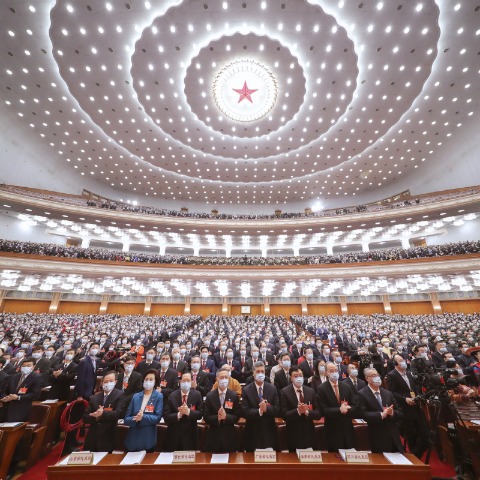



NPC's annual session to review and adopt outline of 14th Five-Year Plan
High-quality growth will remain the key focus for China's economic development during the 14th Five-Year Plan (2021-25) period, and the central government's proposed target for increasing research and development spending indicates the country is making greater efforts to conduct basic research and facilitate innovation-driven development, officials and analysts said.
Improving the quality and effectiveness of development-considered the key to addressing all the issues China faces-is the main priority for the country over the next five years, Premier Li Keqiang said in Beijing while delivering the Government Work Report on behalf of the State Council to the fourth session of the 13th National People's Congress, the country's top legislature, on Friday.
One of the most important tasks for this year's NPC session is to review and adopt the outline of the 14th Five-Year Plan as well as the long-range objectives through 2035. The full draft of the outline has been submitted to the session for deliberation and approval.
Emphasizing the importance of upholding the new development philosophy, the central government pledged to keep major economic indicators within an appropriate range and set annual economic growth targets in light of actual conditions during the 14th Five-Year Plan period, the premier said while summarizing the draft.
He added that the surveyed urban unemployment rate will remain around 5.5 percent.
China reported GDP growth of 2.3 percent last year, making it the world's only major economy to expand amid the COVID-19 pandemic, and set this year's growth target at above 6 percent.
Li Keaobo, a senior researcher at the Academic Center for Chinese Economic Practice and Thinking at Tsinghua University, said that was "low-hanging fruit considering last year's low base, meaning that the government is mapping out space for the tapering-off of stimulus policies introduced last year in view of the effective containment of the pandemic and gradual economic recovery".
"Such policy space will continue to be needed as uncertainty remains in both the pandemic situation and the global economic environment," he said.
However, no specific growth targets have been laid out for the 2021-25 period yet. This means China will have more space to make any policy maneuvers in the face of shifting dynamics at home and abroad, which is conducive to the health of a larger economy, Li Keaobo said.
Pursuing innovation-driven development and accelerating modernization of the industrial system is highlighted in the new five-year plan. The premier said that innovation remains at the heart of China's modernization drive. The country will work faster to enhance its strategic scientific and technological capability, with its R&D spending projected to increase by more than 7 percent annually and account for a larger share of GDP than in the past five years.
Li Keaobo said such targets will be an important indicator of China's economic growth pattern over the next five years.
"Setting the growth rate of R&D spending at 7 percent means that such spending will run faster than GDP growth and, possibly, faster than the growth rate in fixed-asset investment, indicating that the country is channeling more high-quality resources into the science, technology and research sectors," he said.
The draft also shed light on creating a robust domestic market, advancing rural revitalization, boosting green development and promoting reform and opening-up across the board, comprehensively reflecting the country's resolve to pursue high-quality growth.
He Lifeng, head of the National Development and Reform Commission, said that according to the draft outline, China will carry out major projects to guarantee long-term stability and address bottleneck problems regarding the security of energy, food and the supply and industrial chains.
Key projects to drive the country's future development will be carried out in areas such as quantum information and space exploration, he said at a news conference on Friday during the two sessions, the annual meetings of China's top legislative and political advisory bodies.
China will also advance and embark on world-class infrastructure projects and plans to improve people's living conditions by revamping old urban communities and improving elderly and child care and other public services to support the new urbanization strategy, the minister said.
If you have any problems with this article, please contact us at app@chinadaily.com.cn and we'll immediately get back to you.